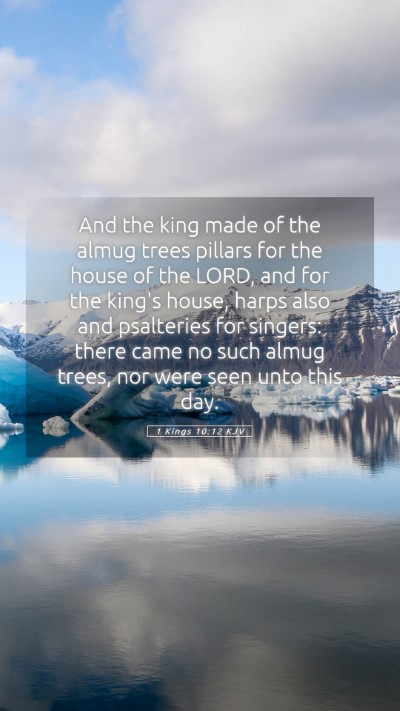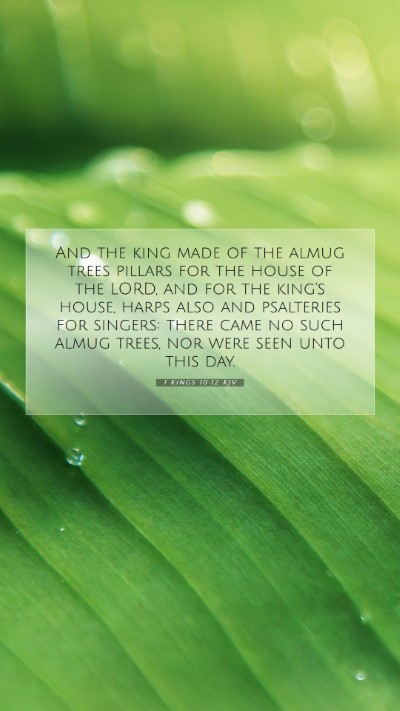Understanding 1 Kings 10:12
Bible Verse: 1 Kings 10:12 - "And the king made of the almug trees pillars for the house of the LORD, and for the king's house, harps also and psalteries for singers: there came no such almug trees, nor were seen unto this day."
Overview of the Verse
This verse describes part of King Solomon's impressive construction projects, emphasizing the use of rare materials and the extraordinary craftsmanship that characterized his reign. Understanding this verse involves recognizing both its literal meaning and its broader implications about wealth, divinity, and leadership.
Bible Verse Commentary
Insights from public domain commentaries provide a deeper look into the text:
-
Matthew Henry:
Henry notes the significance of the almug trees, emphasizing that they were rare and highly valued in construction, which reflects the splendor of Solomon's kingdom. He highlights the dedication of these materials for the worship of God, indicating that Solomon’s priorities were both earthly grandeur and divine reverence.
-
Albert Barnes:
Barnes emphasizes the uniqueness of the almug trees, suggesting that their specific use in constructing pillars and musical instruments points to the blending of beauty and worship. He argues that this reflects an important aspect of Solomon's legacy: the intertwining of cultural achievements and spiritual devotion.
-
Adam Clarke:
Clarke discusses the historical context, detailing how these trees were sought after and used for luxurious purposes. He points out the symbolic nature of using such rare materials in the temple, inferring a deeper message about divine excellence reflected in earthly craftsmanship.
Meaning of the Verse
The verse illustrates the wealth and power of Solomon's reign, characterized by exceptional resources dedicated to both his palace and the temple of the LORD. The use of almug trees signifies not just material wealth but also the importance of beauty in worship. This passage invites readers to reflect on the relationship between material possessions and spiritual values.
Key Themes and Insights
- Divine Worship: The focus on constructing the house of the LORD underlines the importance of worship in Solomon's agenda.
- Wealth and Power: The luxurious use of rare materials like almug wood illustrates Solomon’s incredible status among the nations.
- Cultural Achievement: The verse emphasizes the artistic and cultural innovations during Solomon’s reign, linked to God’s presence and favor.
- Symbolism: The pillars and musical instruments symbolize stability and joy in worship, drawing a connection between material and spiritual realms.
Bible Study Resources
For those interested in delving deeper into the meaning of Bible verses like 1 Kings 10:12, consider utilizing the following Bible study tools:
- Bible study plans focusing on Solomon's reign
- Online Bible study platforms for group discussions
- Bible study guides analyzing Old Testament scripture
- Resources on the historical context of kings in Israel
- Bible study materials exploring worship in ancient Israel
Cross References
This verse connects with other passages in the Scriptures that explore similar themes:
- 2 Chronicles 9:11 - Discusses the same usage of almug trees in Solomon's palace.
- 1 Kings 6:15 - Highlights the materials used in building the Temple.
- 1 Kings 10:21 - Describes the grandeur of Solomon’s court and the materials used therein.
- Psalm 92:4 - Reflects on joy and music in the worship of God.
- 1 Chronicles 29:3 - Talks about King David's contributions to the Temple, suggesting a lineage of dedication.
Application of the Verse
This verse encourages readers to appreciate the intersection of beauty and faith in their own lives. By analyzing the magnificence Solomon achieved, one can draw lessons on dedicating resources to what truly matters: our relationship with God and the expressions of worship that bring us closer to Him.
Conclusion
In summary, 1 Kings 10:12 contributes to the broader narrative of Solomon’s wisdom and devotion. The insights from public domain commentaries enhance our understanding by linking literal interpretations to spiritual applications. Exploring such verses can be enriching and might inspire deeper study and reflection in personal or group Bible study settings.


